Liberia's coffin makers suffer in Ebola outbreak
- Published
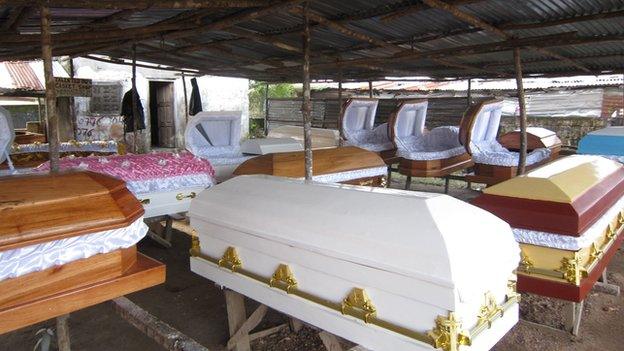
Liberia's coffin trade is suffering as a consequence of the Ebola outbreak ravaging this West Africa nation.
These days body bags have replaced caskets as the corpses of Ebola victims are highly contagious and they must be carefully sealed within them before burial or cremation.
Funerals - big social events, when friends and family would gather around an open casket, often touching their loved one to bid farewell - are also a thing of the past.
"Because of this Ebola situation, people hardly buy from us these days," says carpenter Titus Mulbah, showing visible signs of disappointment when I turned out not to be a customer.
In his mid-20s, he is one of a group running the Talented Brothers Casket Centre on Somalia Drive in the capital, Monrovia.
From humble beginnings, it has grown to occupy two plots, displaying many different kinds of caskets, under corrugated iron roofs along a stretch of road which links the port to the east of the city.
Before the outbreak of Ebola, Mr Mulbah said business was good with funeral services all over the city especially at weekends.
"For the last two months it has been difficult to sell even one casket a day," Mr Mulbah laments.
"And this is all because all bodies now are considered Ebola bodies, as if other diseases are not killing people here."
The coffin maker says there is no space to put new stock "so we come here just to sit and sleep all day and go back home".
Undertakers fear corpse contact
As he speaks a van mounted with loud speakers broadcasting Ebola information messages passes by. As has become common practice everywhere, the coffin shop follows new protocols including the regular washing of hands and avoiding bodily contact.
"We have brought the prices down, but still people are not coming to buy," Mr Mulbah says.
"It hurts; but we have to abide by the government's rules."
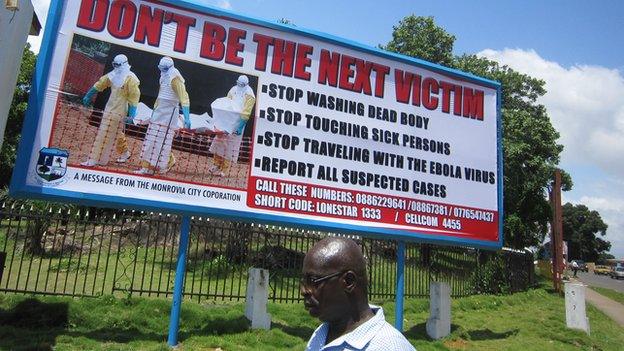
There are information posters all over the city where the virus is affecting cultural practices
Even more frustrating is that people who made advance payments for coffins are asking for refunds, he adds.
Undertakers are also being affected, with formal burials being abandoned.
But Moses Ahoussouhe, proprietor of the St Moses Funeral Parlours in the same area, said he backed the safety measures, as he did want to come into contact with bodies that may not have been tested for Ebola.
"We prefer going short on cash now, compared to doing the wrong things and getting affected; so we go by the flow of the government's restriction and policy," he told the BBC.
Following resistance from some communities to having Ebola victims buried in their area, it has been decreed that people dying from Ebola in the Monrovia area be cremated.
The government has had to hire experts and bring in a crematorium so that bodies are not burnt in the open.
"We know cremation is not our culture in our country; our culture is burial," said Tolbert Nyenswah, Liberia's assistant health minister, who heads the government's Ebola response.
"But now we have disease; so we have to change the way we used to do business."
Secret burials
However, Mr Nyenswah said fear of cremation had led many to remain at home to die instead of seeking treatment.
A recent analysis of bed space at Ebola treatment centres showed that out of 742, 391 were vacant, he said.

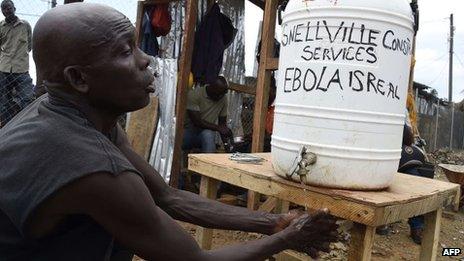
Hand-washing is considered an important measure in halting the spread of Ebola
Avoid direct contact with sick patients as the virus is spread through contaminated body fluids
Wear protective cover for eyes
Clothing and clinical waste should be incinerated and any medical equipment that needs to be kept should be decontaminated
People who recover from Ebola should abstain from sex or use condoms for three months

"We understand that there are secret burials taking place in the communities; let's stop that and report sick people and get them treated."
Health ministry officials say tests are done to ensure that only the bodies of Ebola victims are cremated; but some people have complained that those who have died of other causes have also been included.
"I lost my relative who was never tested or treated; she died and the body was cremated," said television journalist Eddie Harmon, adding that it was "unjust and unfair".
The families of Ebola victims do not have any control over what happens to the bodies.
Graveyard day
They will also have to come to terms with the fact that they will never see the graves of their loved ones.
Visiting cemeteries is an important part of the culture here.
The second Wednesday in March is a public holiday - National Decoration Day - when most people go to cemeteries to clean and redecorate the graves of their relatives.
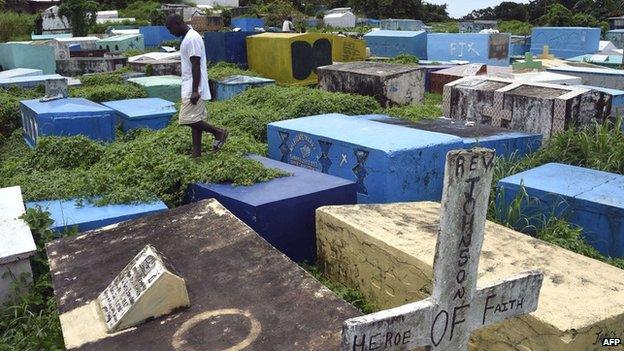
Liberia has a public holiday to allow people to go to cemeteries to clean and decorate graves
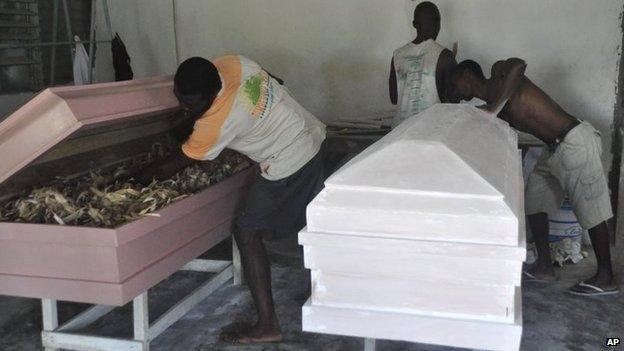
There is little production of caskets now as the stock is not moving
The hasty removal of Ebola victims means these days will be a painful reminder of the virus' legacy for many families, without any physical monument to mark their lives.
When President Ellen Johnson-Sirleaf declared the state of emergency in August, she summed up the despair of many with the words: "Ebola has attacked our way of life."
Back at the casket centre, Mr Mulbah keeps his eyes on the road looking out for customers.
But the vehicles stopping only drop off passengers who walk in the opposite direction.
He clings to the belief that has become prevalent in Liberia that the coming dry season will somehow break the epidemic - heavy rain can make roads impassable and hamper aid efforts in a country with little infrastructure.
"We want see Ebola go so that we can get back into business," he says.
Watch this short video explaining how the virus attacks human cells